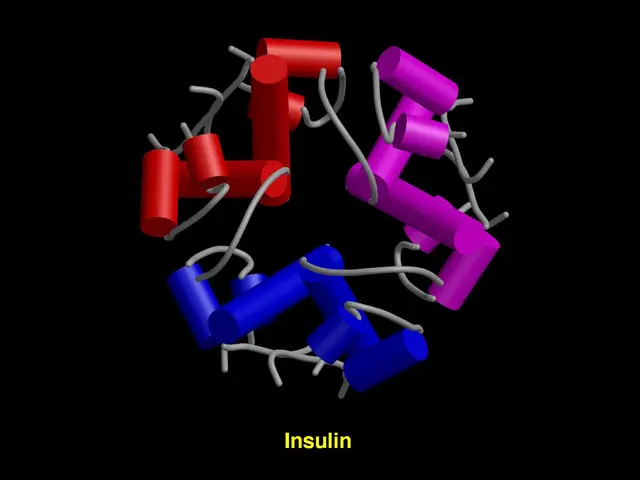Prescribed Drug Vyvanse: Understanding potential adverse effects and strategies for management
In the treatment of binge eating disorder, attention deficit hyperactivity disorder (ADHD), and other conditions, Vyvanse (lisdexamfetamine) is a commonly prescribed medication. However, it's essential to understand the potential side effects, especially when used long-term.
For children, long-term Vyvanse use can lead to suppressed appetite, which may result in concerns about adequate nutrition. Children may struggle to eat during the medication's effect and must be monitored for weight loss or stunted growth. There's also a risk of decreased growth over time, including stunted height development. Additionally, children may develop tics and experience mood changes, including the potential for hallucinations or psychosis.
Adults, on the other hand, may face different challenges with long-term Vyvanse use. Malnutrition due to appetite suppression is a possibility, although adults may manage their intake differently from children. There's also a risk of developing tolerance, physical dependence, and addiction, which can lead to withdrawal symptoms upon stopping the medication. Mental health complications like paranoia, hostility, and psychosis are more common with abuse or non-prescribed use.
Lifestyle consequences such as impaired work performance, legal problems, interpersonal conflicts, job loss, and child neglect are also potential issues for adults. In cases of abuse through non-oral routes (intranasal or intravenous), adults may experience physical complications like sinusitis, nasal septum perforation, collapsed veins, infections (HIV, hepatitis), abscesses, and heart lining infections.
Long-term stimulant use increases cardiovascular risks such as hypertension and arterial disease, although evidence is still emerging regarding the differential impact by age. It's important to note that these complications are generally not concerns for children under supervised medical use.
Mild side effects reported in both adults and children include loss of appetite, dry mouth, anxiety, abdominal pain, increased heart rate, constipation or diarrhea, irritability, dizziness, feeling jittery, headache, nausea and vomiting, and sleep problems.
More serious side effects include cardiovascular problems, blood circulation problems in the fingers and toes, serotonin syndrome, mental health side effects, slowed growth in children, and a boxed warning for the risk of misuse and dependence.
It's crucial to discuss any questions about Vyvanse's side effects, especially in children, with a doctor or pharmacist. If side effects last longer than a few days or weeks, bother the patient, or become severe, it's important to talk to a healthcare provider.
In case of an allergic reaction to Vyvanse, symptoms may include hives, swelling of the face, mouth, lips, throat, or tongue, difficulty breathing or swallowing, and rapid heartbeat. If you or someone you know is in crisis and considering suicide or self-harm, please seek support through the 988 Lifeline, Crisis Text Line, Befrienders Worldwide, or by calling 911 or your local emergency services number.
Lastly, it's important to note that Vyvanse can have harmful effects if taken during pregnancy or while breastfeeding. The patient should report any side effects to the FDA through the MedWatch program. Children's doctors will monitor their height and weight compared to average growth rates for their age due to the risk of slowed growth. The patient should also inform their doctor of any other medications they are taking, as Vyvanse can interact with certain drugs. If the patient develops serious side effects while taking Vyvanse, they should call their doctor right away or go to the emergency room.
- The side effects of Vyvanse, particularly when used long-term, can be a concern, especially in children as appetite suppression can lead to concerns about adequate nutrition and potential growth issues.
- Adults may also face the risk of malnutrition due to appetite suppression, as well as the development of tolerance, physical dependence, and addiction.
- Long-term Vyvanse use in children can potentially lead to tics, mood changes, and even stunted height development.
- Mental health complications like paranoia, hostility, and psychosis are more common with abuse or non-prescribed use in adults.
- Lifestyle consequences such as impaired work performance, legal problems, interpersonal conflicts, and child neglect are potential issues for adults.
- In addition to mild side effects like loss of appetite, dry mouth, anxiety, and headaches, more serious side effects include cardiovascular problems, blood circulation problems, serotonin syndrome, mental health side effects, and slowed growth in children.
- It's crucial to discuss any concerns about Vyvanse's side effects, especially in children, with a doctor or pharmacist, and to report any side effects to the FDA through the MedWatch program.
- Vyvanse can have harmful effects during pregnancy or while breastfeeding, so it's essential to inform your doctor of any other medications you are taking, as Vyvanse can interact with certain drugs.





